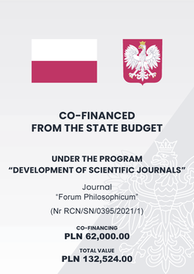- Home »
- Issues »
- 25/1 – Spring 2020 »
- Articles »
Phenomenology of Interior Life and the Trinity
Analysing Michel Henry’s phenomenological schism between Life and World in light of the Christian Doctrine of the Trinity
Abstract
Michel Henry radicalises phenomenology by putting forward the idea of a double manifestation: the “Truth of Life” and “truth of the world.” For Henry, the world turns out to be empty of Life. To find its essence, the self must dive completely inward, away from the exterior movements of intentionality. Hence, Life, or God, for Henry, lies in non‑intentional, immanent self-experience, which is felt and yet remains invisible, in an absolutist sense, as an a priori condition of all conscious experience. In Christian theology, the doctrine of the Trinity illuminates the distinction between the immanent Trinity (God’s self‑relation) and the economic workings of the Trinity (God‑world relation). However, the mystery of God’s inmost being and the economy of salvation are here understood as inseparable. In light of this, the paper aims to: 1) elucidate the significance of Henry’s engagement with the phenomenological tradition and his proposal of a phenomenology of Life which advocates an immanent auto‑affection, radically separate from the ek‑static nature of intentionality, and 2) confront the division between Life and world in Henry’s Christian phenomenology and its discordancy with the doctrine of the Trinity, as the latter attests to the harmonious unity that subsists between inner life and the world.
Keywords
Cite this article
Farrugia, Robert. “Phenomenology of Interior Life and the Trinity: Analysing Michel Henry’s phenomenological schism between Life and World in light of the Christian Doctrine of the Trinity.” Forum Philosophicum 25, no. 1 (2020): 71–88. doi:10.35765/forphil.2020.2501.5.
Bibliography
Agamben, Giorgio. 2011. The Kingdom and the Glory: For a Theological Genealogy of Economy and Government. Translated by Lorenzo Chiesa and Matteo Mandarini. Stanford: Stanford University Press. Calcagno, Antonio. 2004. “The Incarnation, Michel Henry, and the Possibility of an Husserlian-inspired Transcendental Life.” The Heythrop Journal 45 (3): 290–304. https://doi.org/10.1111/j.1468-2265.2004.00256.x. Catechism of the Catholic Church. 1994. 2nd edition ed. Vatican City: Libreria Editrice Vaticana. Dani.lou, Jean. 1969. God’s Life in Us. Translated by Jeremy Leggat. Denville, N.J.: Dimension Books. Descartes, Ren.. 1998. Discourse on Method. Translated by Donald A. Cress. Cambridge: Hackett. Grenz, Stanley J. 2001. The Social God and the Relational Self. Louisville: Westminster John Knox Press. Henry, Michel. 1973. The Essence of Manifestation. Translated by Girard Etzkorn. The Hague: Martinus Nijhoff. —. 2003a. I am the Truth: Toward a Philosophy of Christianity. Translated by Susan Emanuel. Stanford: Stanford University Press. —. 2003b. “Phenomenology of Life.” Angelaki: Journal of the Theoretical Humanities 8 (2): 97–110. https://doi.org/10.1080/0969725032000162602. —. 2008. Material Phenomenology. Translated by Scott Davidson. New York: Fordham University Press. —. 2012. Words of Christ. Translated by Christina M. Gschwandtner. Grand Rapids, MI: Eerdmans. —. 2015. Incarnation. Translated by Karl Hefty. Evanston, IL: Northwestern University Press. Husserl, Edmund. 1965. “Philosophy and the Crisis of European Man.” In Phenomenology and the Crisis of Philosophy, 149–92. New York: Harper & Row. Janicaud, Dominique. 2000. “The Theological Turn of French Phenomenology.” In Phenomenology and the ‘Theological Turn’: The French Debate, 3–103. New York: Fordham University Press. Kierkegaard, S.ren. 2009. Works of Love. Translated by Howard V. Hong and Edna H. Hong. New York: Perennial. LaCugna, Catherine Mowry. 1991. God for Us: The Trinity and Christian Life. New York: HarperSanFrancisco. Litfin, Bryan M. 2019. “Tertullian on the Trinity.” Perichoresis 17 (1): 81–98. https://doi.org/10.2478/perc-2019-0012. McCaffrey, Enda. 2013. “From the Truth of the World to the Truth of Life.” Radical Orthodoxy: Theology, Philosophy, Politics 1 (3): 516–37. Rahner, Karl. 1978. Foundations of Christian Faith. Translated by William V. Dych. New York: Crossroad. —. 2001. The Trinity. Translated by Joseph Donceel. London: Burns and Oates. Rivera, Joseph. 2015. The Contemplative Self after Michel Henry. Notre Dame, IN: University of Notre Dame Press. —. 2018. “Phenomenologies of the Trinity: Trends in Recent Philosophy of Religion.” Philosophy Compass 14 (1). https://doi.org/10.1111/phc3.12561. Seyler, Fr.d.ric. 2012. “From Life to Existence: A Reconsideration of the Question of Intentionality in Michel Henry’s Ethics.” Journal of French and Francophone Philosophy 20 (2): 98–115. https://doi.org/10.5195/jffp.2012.530. Stein, Edith. 2000. Knowledge and Faith. Translated by Walter Redmond. Washington, D.C.: ICS Publications. —. 2002. Finite and Eternal Being: An Attempt at an Ascent to the Meaning of Being. Translated by Kurt F. Reinhardt. Washington, D.C.: ICS Publications. Williams, James. 2008. “Gilles Deleuze and Michel Henry: Critical Contrasts in the Deduction of Life as Transcendental.” Sophia 47 (3): 265–79. https://doi.org/10.1007/s11841-008-0073-4. Zahavi, Dan. 2007. “Subjectivity and Immanence in Michel Henry.” In Subjectivity and transcendence, edited by Arne Gron, Iben Damgaard and S.ren Overgaard, 133–47. Tübingen: Mohr Siebeck.





